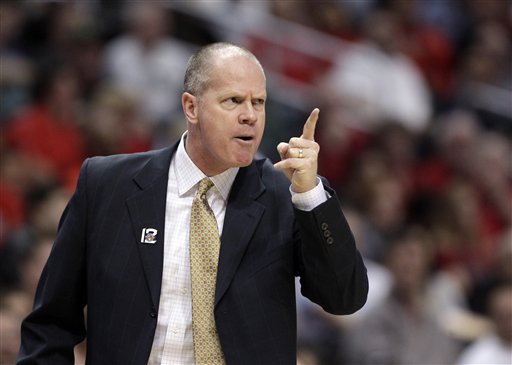Pac-12 Burning Questions: Can Colorado’s Offense Be Better Than Awful?
Posted by Mike Lemaire on October 28th, 2016Here is a factoid that might surprise Pac-12 fans: Colorado, a team that won 22 games last season and made the NCAA Tournament, did so despite having the worst offense in the conference — a conference that also included the putrid offense that Washington State trotted out. Apologies to the folks in Pullman, but there is strong evidence to support this assertion. You might even want to shield your eyes. In Pac-12 play, the Buffaloes finished 11th in adjusted offensive efficiency (100.5), 12th in effective field goal percentage (45.8%) and 12th in turnover percentage (19.2%). Zoom out from the conference-only statistics and it’s not much better. Colorado ranked 229th overall in turnover percentage (18.8%) and 242nd in effective field goal percentage (48.4%). The latter number is particularly futile when you consider that the Buffaloes were one of the 25 most accurate teams in the country from behind the three-point arc (38.4% 3FG). It makes more sense when you also consider that there were just 20 teams in the country that shot a worse percentage than the Buffs from inside the three-point line (43.9% 2FG). It is amazing how Colorado managed to rank as high as 100th nationally in adjusted offensive efficiency.

Tad Boyle, despite some offensive woes, is still one of the best in the Pac-12. (AP Photo/Jae C. Hong)
Almost everyone is back from last season’s clank-fest except, of course, the team’s most efficient offensive player and one of the best offensive rebounders in the country, Josh Scott. What Scott left behind is a hodgepodge of talented but inconsistent guards, a pair of potentially electric wing players with big question marks, and a host of able-bodied big men without a refined offensive move between them. It doesn’t sound like a recipe for drastic improvement but there are the makings of an excellent offensive team here. There is also a reasonable chance that, if the offense improves and the defense remains suffocating, Colorado could compete for the conference title. Even though Scott was arguably one of the best frontcourt players in program history, head coach Tad Boyle should feel good about his team’s depth up front. Senior Wesley Gordon will anchor the unit as an arguably better rebounder and shot-blocker than Scott, albeit without the offensive upside. Junior Tory Miller is an offensive liability but he is another athletic big body who played meaningful minutes, and freshman seven-footer Dallas Walton could be a special defensive player with his length and athleticism. But none of the trio are offensive-minded players and if Boyle wants his offense to have a fighting chance, he would be smart to only play one of those three at a time.
He can do this because Xavier Johnson, who gives the Buffaloes a lot of positional flexibility, is back after missing all of last season with a torn ACL. The 6’7″ senior can stretch the floor with his shooting (36.7% 3FG) but he is also an exceptional rebounder at both ends of the floor and can guard most opposing power forwards. If Johnson can play power forward, that will allow George King to stay outside the paint where he is clearly more comfortable (45.9% 3FG on 146 attempts). King may be asked to take a larger interest in rebounding and defending this season, but make no mistake, he is a very good offensively-minded player. If he continues to improve, he could be a legitimate conference Player of the Year candidate. The backcourt is where things get interesting because there are so many options. De facto point guard Dominique Collier made nearly half of his 88 three-point attempts (44.3%) and senior Josh Fortune made 37.4 percent of his 139 three-point attempts last season. They are the presumptive starters and offer quite a bit of firepower from those positions. Belgian sophomore Thomas Akyazili offers ball-handling and passing. Transfer Derrick White averaged 25.8 points per game at the Division II level in 2014-15 and freshmen Bryce Peters comes to Boulder with the reputation of a scoring guard so there are weapons at Boyle’s disposal.
The flip side is that these players also come with very visible warts. King is a bit of a ball-stopper. Fortune and Collier were turnover machines last season, especially in conference play. Johnson still must prove that he is fully recovered. White needs to prove he can score against Division I opponents, and Peters hasn’t played a minute of college basketball. It would be easy to assume that King and Fortune and Collier will all be much better with another year of experience and that Johnson can be a double-figure scorer again, but the Buffaloes can’t bank on those assumptions. How Colorado answers this question will have a significant impact on its ultimate success this season. The defense should remain stout, so if the offense can be even marginally better than it was last season, the Buffaloes are Pac-12 title contenders.









































